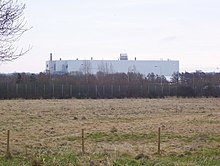
Langley, also known as Langley Marish, is a large village in the unitary authority of Slough in South East England. It is two miles (3 km) east of central Slough, with which it is contiguous, and 18 miles (29 km) west of Charing Cross in Central London. Langley is located in the historic county of Buckinghamshire.
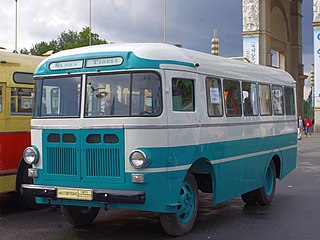
The Riga Autobus Factory was a factory in Jelgava, Latvia, making vans and minibuses under the brand name Latvija.
The automotive industry in the United Kingdom is now best known for premium and sports car marques including Aston Martin, Bentley, Caterham Cars, Daimler, Jaguar, Lagonda, Land Rover, Lister Cars, Lotus, McLaren, MG, Mini, Morgan and Rolls-Royce. Volume car manufacturers with a major presence in the UK include Honda, Nissan, Toyota and Vauxhall Motors. Commercial vehicle manufacturers active in the UK include Alexander Dennis, Ford, IBC Vehicles, Leyland Trucks and London Electric Vehicle Company.

Southampton Airport is an international airport officially located in Southampton, Hampshire in the United Kingdom. The airport, most of which is just across the border in the Borough of Eastleigh, is 3.5 nautical miles north-north-east of central Southampton.

The Ford Transit, also known as the Ford T-Series in some markets, is a range of light commercial vehicles produced by Ford since 1965. Sold primarily as a cargo van, the Transit is also built as a passenger van, minibus, cutaway van chassis, and as a pickup truck. Over 8,000,000 Transit vans have been sold, making it the third best-selling van of all time and have been produced across four basic platform generations, with various "facelift" versions of each.

The Ford Transit Connect is a compact panel van developed by Ford Europe. It is built on a dedicated commercial vehicle platform and shares parts with the Ford Focus. The first generation was designed by Peter Horbury and introduced in 2002 to replace the older Ford Escort and Fiesta-based Courier van ranges, which had ceased production in the same year. It has been imported to the North American market since the 2010 model year. In North America, the Transit Connect does not have a direct predecessor; the closest vehicle to its size was the standard-length Ford Aerostar cargo van, which ceased production in 1997.

A panel van — also known as a blind van, car-derived van or sedan delivery — is a cargo vehicle based upon passenger car chassis, and typically has one row of seats with no side windows at the rear. Panel vans are smaller than panel trucks and cargo vans, both of which are built on truck chassis.

Swaythling is a suburb and electoral ward of the city of Southampton in Hampshire, England. The ward has a population of 13,664.
Bedford Vehicles, usually shortened to just Bedford, was a brand of vehicle manufactured by Vauxhall Motors, then a subsidiary of multinational corporation General Motors. Established in April 1931 and constructing commercial vehicles, Bedford Vehicles was a leading international lorry brand, with substantial export sales of light, medium, and heavy lorries throughout the world.

Ford of Britain is a British wholly owned subsidiary of Blue Oval Holdings, itself a subsidiary of Ford International Capital LLC, which is a subsidiary of Ford Motor Company. Its business started in 1909 and has its registered office in Brentwood, Essex. It adopted the name of Ford of Britain in 1960.

The Dodge 50 Series, later known as the Renault 50 Series were light commercial vehicles produced in the UK by Chrysler Europe and later Renault Véhicules Industriels between 1979 and 1993.
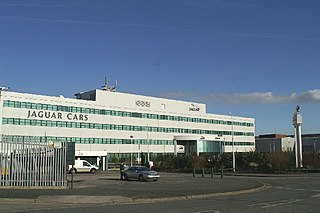
Halewood Body & Assembly is a Jaguar Land Rover production facility in Halewood, Merseyside, England.
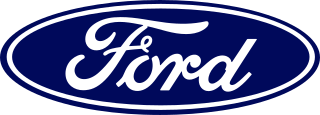
Ford-Werke GmbH is a German car manufacturer headquartered in Niehl, Cologne, North Rhine-Westphalia and a subsidiary of Ford of Europe, which in turn is a subsidiary of Ford Motor Company. The company operates two large manufacturing facilities in Germany, a plant in Cologne and a plant in Saarlouis.

Ford of Europe GmbH is a subsidiary company of Ford Motor Company founded in 1967 in Cork, Ireland, with headquarters in Cologne, Germany.
Cunliffe-Owen Aircraft was a British aircraft manufacturer of the World War II era. They were primarily a repair and overhaul shop, but also a construction shop for other companies' designs, notably the Supermarine Seafire. The company also undertook contract work for the Air Ministry, Lord Rootes, Shorts and Armstrong Siddeley worth £1.5 million. After the war, however, the company began to face financial difficulties and in February 1947 a request to Midland Bank to extend the company's overdraft was refused. In November of that year it became necessary to suspend production of the Concordia aircraft – upon which all the company's future hopes rested – and its financial collapse became inevitable.
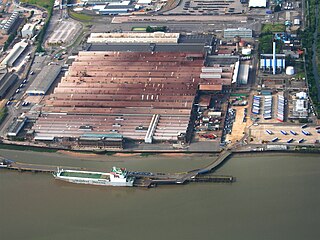
Ford Dagenham is a major automotive factory located in Dagenham, London, operated by the Ford of Britain subsidiary of Ford Motor Company. The plant opened in 1931 and has produced 10,980,368 cars and more than 39,000,000 engines in its history. It covers around 475 acres and has received over £800 million of capital investment since 2000.
Ford Trafford Park Assembly Plant was a car assembly plant established by Ford of Britain at Trafford Park, beside the Manchester Ship Canal, a short distance to the west of Manchester. It was the first manufacturing plant established by Ford outside the United States, though originally it was established merely to assemble vehicles using parts imported from Dearborn.

The Ford Motor Company, commonly known as Ford, is an American multinational automaker that has its main headquarters in Dearborn, Michigan, a suburb of Detroit. It was founded by Henry Ford and incorporated on June 16, 1903. The company sells automobiles and commercial vehicles under the Ford brand, and most luxury cars under the Lincoln brand. Ford also owns Brazilian SUV manufacturer Troller, an 8% stake in Aston Martin of the United Kingdom and a 32% stake in Jiangling Motors. It also has joint-ventures in China, Taiwan, Thailand, Turkey, and Russia. The company is listed on the New York Stock Exchange and is controlled by the Ford family; they have minority ownership but the majority of the voting power.

The Ford Bridgend Engine Plant was an internal combustion engine factory owned by Ford of Europe and located in Bridgend, Wales. Between 1980 and 2020, it made over 22 million engines used in Ford, Volvo, Jaguar and Land Rover cars.

Henry Ford & Son Ltd is the Irish subsidiary of the United States-based automaker Ford Motor Company. With an assembly plant for motor vehicles, it was part of the automotive industry in Ireland.
